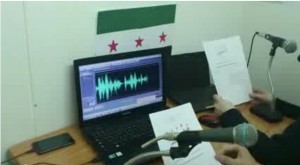Online Radio Stations: A New Experience of the Syrian Media

The last two years have witnessed the emergence of new media tools that have accompanied the Syrian revolution. These new tools have relied on the efforts of men and women volunteers, and reached its audience through the Internet, thus challenging the government’s monopoly on media.
Among the most significant tools are radio stations that broadcast over the internet, offer a variety of programmes, and target a wide segment of the Syrian audience. This gives these radio stations an edge over the social media webpages, particularly those of Facebook and YouTube, which are run by the Local Coordination Committees and focus on the security and political developments in different areas.

One of the radio initiatives that were launched after the public protests’ outbreak in 2011 is Damascus Online, which has been broadcasting online from a secret location in Damascus since April 2012. It is promising its audience to start broadcasting on FM waves soon. Damascus Online was established by forty young men and women graduates or students of media who developed their broadcasting skills by attending trainings.
Owais al-Omar, one of the project’s supervisors, says that Damascus Online aims at providing the Syrian citizens with a “local, honest [discourse] that touches upon their interests and meets their needs.”
Such needs, according to Omar, have been ignored by the Syrian media, which has suffered from the absence of freedom for decades.
The security and political developments dominate the content of the programmes aired on Damascus Online. This content can be anything from broadcasting the news and on-ground developments, which are covered by a group of reporters in Damascus and Damascus countryside; to looking at the experiences of previous political detainees who were subjected to torture; in addition to monitoring the political changes Syria is witnessing through special programmes that are meant to introduce certain concepts to its audience like the concept of “transitional government.”
The Syrian diaspora has, similarly, played a role in developing these kinds of initiatives. Yasmeen Al-Shaam (Damascus’ Jasmine) is a radio station based in Saudi Arabia which broadcasts through the Internet from a studio that was provided for free by young Syrian men who work in the music recording industry.
Their “virtual” radio team is spread over Syria and other countries; the staff communicates by email and Skype. Programmes address special issues of the Syrian society that have a “humane” focus as described by Ahmad Ameeqa, one of the radio supervisors.
Yasmeen Al-Shaam has set a clear goal for itself, according to Ameeqa, and that is “to serve the revolution.” Ameeqa emphasizes that the station is not affiliated with any political party or orientation, nor is it biased for any ethnic or religious group in Syria, despite the fact that it features some Islamic songs and prayers on its Facebook page.
“There is a programme that it fully dedicated for Kurds and religious sects [other than Sunnis] and our programmes adopt moderate thinking,” says Ameeqa.
The head of the Syrian Journalists Association, Oqba al-Ahmad, commends the role played by the new media, particularly in revealing human rights violations, despite the technical obstacles.
“The new media has [played] the biggest role in exposing the regime’s violations and the massacres, which were and are committed against civilians in Syria, to the world in spite of the obstacles and the difficulties,” says Ahmad.
“Media activists have been able to overcome the repeated interruption of Internet services by using…Internet networks of neighbouring countries. Activists have been able to broadcast news and videos through satellite Internet.”
In addition to performing the provisional role explained by Ahmad, Owais al-Omar, who works with Damascus Online, hopes that his radio station will form, along with other similar stations, the cornerstone for a new type of media in Syria.
Omar looks forward to having the work scope of this young institution expand in the future and for its broadcasted content to diversify. He hopes that his station will contribute to establishing a “mature media that respects the minds of the Syrian recipients and benefits them in their lives by providing knowledge…news and entertainment.”
